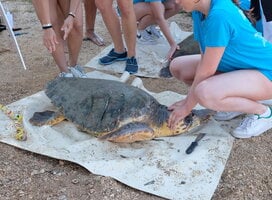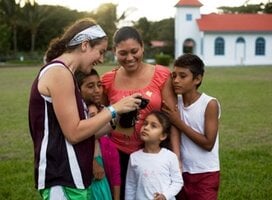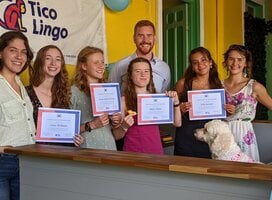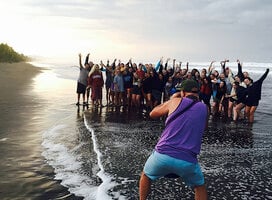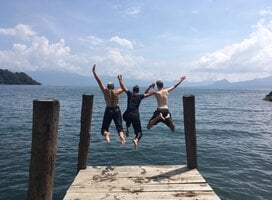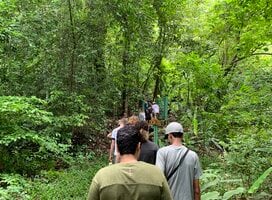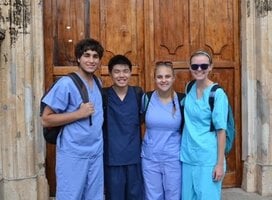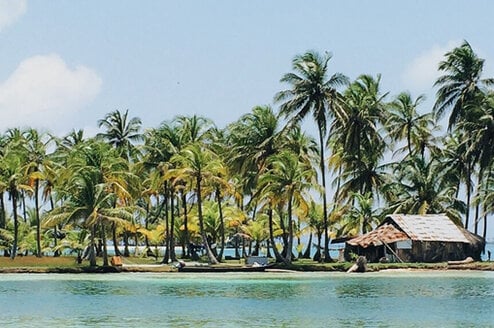High School Abroad in Costa Rica
Lush, beautiful, and inviting Costa Rica may not be the most traditional of study abroad destinations, but it's quickly made it's way up the list to become one of the most popular. With friendly, Spanish-speaking locals, a truly unique, tropical ecosystem, and a well-established player in the adventure travel scene, Costa Rica has options for everyone -- from the linguists to the ecology nerds to the surfers and the rest of you who are somewhere in between.
Especially among high school students (and their parents!), Costa Rica is an attractive destination because it's affordable, close to home, incredibly safe, and an easy country for first-time travelers to navigate. So, read on and learn more about how to do high school abroad in Costa Rica!
Costa Rica is great for students who: want to improve their Spanish skills, contribute to communities abroad, or learn more about Costa Rica's tropical ecosystems.
Costa Rica is one of the most popular countries for study abroad (both among high schoolers and college students) and, as such, has a wide selection of abroad programs for teens. A majority of programs in Costa Rica will focus on Spanish, ecology, or some combination of both. Whether you're more interested in rolling your r's or learning about the habitats of howler monkeys, high school abroad in Costa Rica will likely fall under one of the following program types:
- Spanish language immersion
- Teen travel program
- Volunteering / service-learning
- Leadership trips
- Semester or year abroad
Spanish language immersion
Some say Costa Rican Spanish is one of the easiest versions to learn and, fortunately for teens looking to take their Spanish to the next level, there are dozens of Spanish immersion programs to choose from. Opt for a quick one-week spring break trip, 1 - 2 months in the summer, or however long you're able to commit for.
Often, teen Spanish programs in Costa Rica will include living with a homestay family to truly create an immersive learning environment. Take that, high school Spanish classes!
Teen travel program
Especially if you only have a week over spring break or a couple of weeks over the summer, another popular option is to spend time traveling through Costa Rica on an educational tour. Although the exact itinerary of the programs will vary from provider to provider, Costa Rica's teen travel programs do have a decidedly adventurous air about them.
Although you're absolutely likely to spend time learning about Costa Rica's rainforests, marine habitats, or local culture and language, you'll also learn to break out of your comfort zone by ziplining, surfing, kayaking, or any other number of adventure sports.
Volunteering / service-learning
Although Costa Rica is a fairly developed and very stable (and safe!) country -- especially compared to other neighboring Central American countries -- it's still technically an emerging economy. Meaning, volunteers are needed to help with community service or environmental conservation projects throughout the country.
Projects include everything from sea turtle conservation to helping with arts and crafts programs for younger children. Many of these teen volunteer trips will be a blend of learning about the local community and / or Spanish and volunteering ("service-learning", in other words).
Leadership trips
Interestingly, there are several program providers in Costa Rica that send teens on "leadership trips" where they'll learn important leadership skills through outdoor education.
Semester or year abroad
For truly adventurous teens, there's the option to study abroad for a full semester or year in Costa Rica. Most of these programs will have a Spanish learning component and place students with a host family to live with throughout their time abroad.
Popular Cities
San Jose / Heredia
Most programs will start off in San Jose, where Costa Rica's main international airport is located. However, few students actually stay here in the capital -- which is a cool, mountainous city and not quite the rainforest-filled or beachy Costa Rica you're daydreaming about. Instead, students will often head west or north to one of Costa Rica's national parks or smaller towns. Exact destinations vary by program.
Student Visa Requirements
If you're entering Costa Rica for less than 90 days, you'll be able to do so on a tourist visa. For Americans / Canadians / most Europeans, there's no need to apply for a tourist visa in advance and students will be given one on arrival. Do note, however, that Costa Rica is one of the few countries in the world to require visitors to pay an exit tax ($29 at the time of writing), so don't max out your bank account on your last day there!
If you're staying longer than 90 days, you will be required to renew your visa before the 90-day mark. You can do this by taking an excursion to Panama or Nicaragua. Your program provider, however, should have options and protocol in place for this.
Student visas are only offered to students who are enrolled in a full degree program.
Student Housing
Homestays are a common option for students who opt for high school abroad programs in Costa Rica. However, and especially with short-term or teen travel programs, students may also stay in shared hotel rooms or dorms.
If you are staying in a more remote area of the country, your accommodation could be on the basic side.
Costs
Compared to its Central American neighbors, Costa Rica is definitely more expensive. However, the cost of living in Costa Rica is on par with living in a mid-sized American city, like St. Louis.
Most expenses (or at the very least, the most costly expenses) will be covered in your program fee (i.e. housing, food, in-country travel). For anything additional, like snacks, souveniers, and personal items, budget between $20 - $40 per day.
Cultural Etiquette
Costa Ricans (also known as Ticos) are generally polite and courteous. However, there are a few cultural tips to help you with your time in Costa Rica:
- Women greet women and men with a kiss on the cheek (not an actual kiss, just a kissy sound / "air kiss"). Men do not greet other men with a kiss, but a handshake.
- If you're staying with a host family, make sure to get them a small gift as a thank you!
- Costa Rica is mainly Catholic and, as such, fairly conservative.
Packing Tips
It's a good idea to opt for a backpack, rather than a suitcase, to put all your stuff in. At the very least, make sure your luggage is easy to carry around in areas where there might not be well-paved roads. Also, no matter how long you're going to Costa Rica for, be sure to pack:
- A headlamp (just in case!)
- Good hiking shoes / trail runners
- Rain jacket
- Warm layers (it can be chilly in the mountains certain times of the year)
- Water bottle
- Bathing suit
- Quick-dry towel
- Snacks (totally optional, but I love bringing a few!)
- Sunscreen and bug spray (both are expensive there)
Health
Traces of the Zika virus have been found in Costa Rica. To learn more about Zika and how to avoid getting infected, read the Washington Post's article on Zika precautions.
No special vaccinations outside of your routine ones are needed to enter Costa Rica. Hepatitis A and typhoid is recommended, but not necessary. Costa Rica is a malaria-free country, but definitely not mosquito free. Bring your bug spray.
Otherwise, Costa Rica is pretty clean and easy to stay healthy in. Just double check that the tap water is drinkable before filling up your water bottle, make sure you wash off fruits and veggies before eating, use sunscreen, and take any other normal precautions that you would at home.
Safety
Again, Costa Rica is an incredibly safe country. However, your main risk will be pickpockets and even then, mostly just within San Jose. Do not go out alone at night in San Jose and stay out of any neighborhoods your program provider has identified as unsafe. When in San Jose, keep an eye on your valuables.
In beach areas, be careful of riptides and strong undercurrents.

